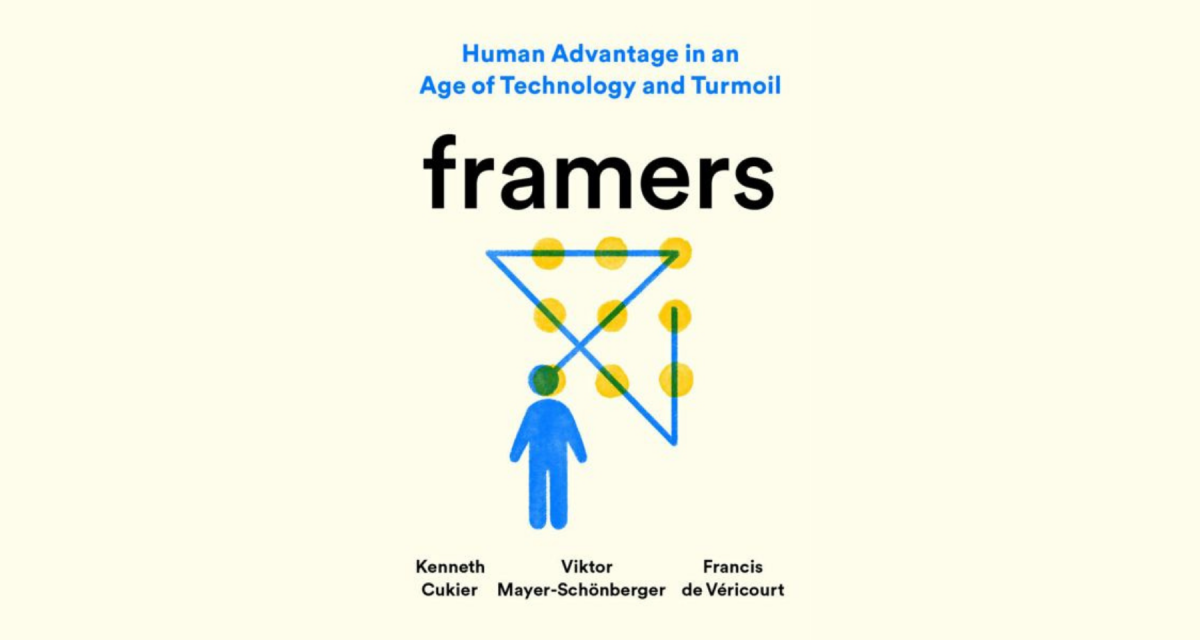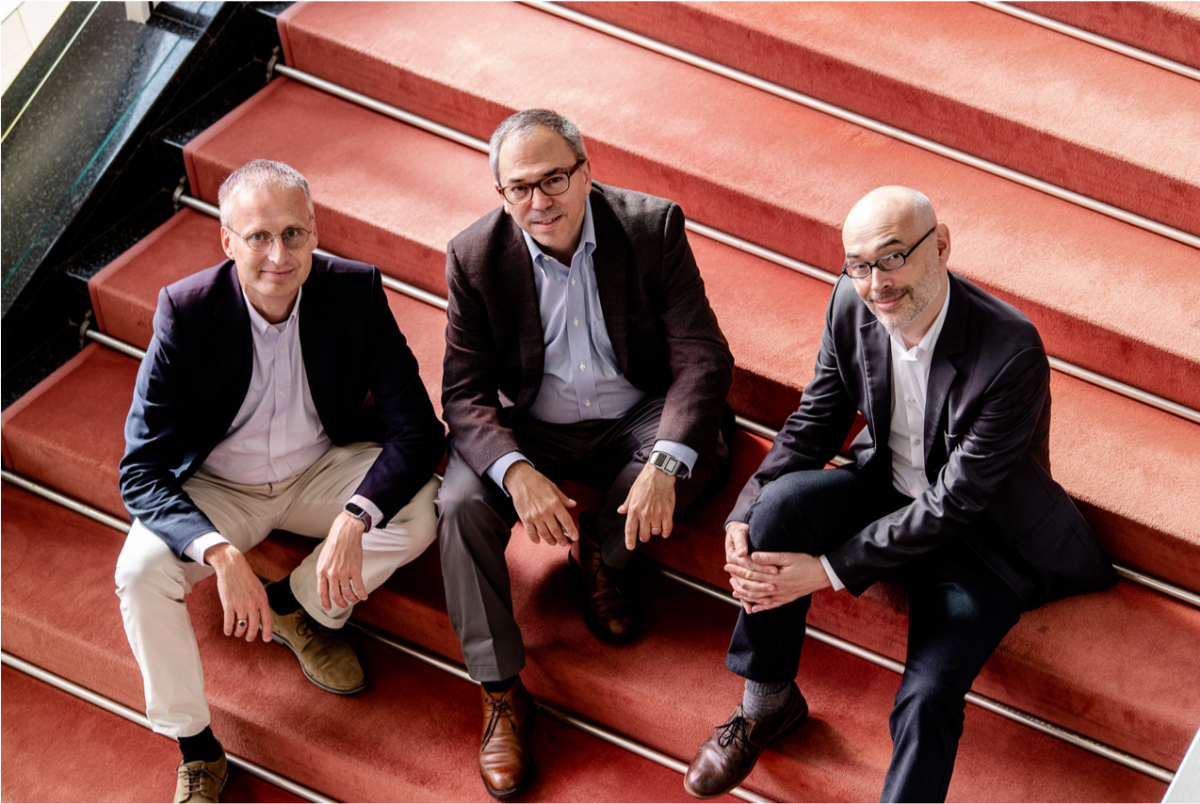Excerpt of Framers, a new book on the power of mental models to make better decisions
by Kenneth Cukier, Viktor Mayer-Schönberger, and Francis de Véricourt
Publisher: Dutton (11 May 2021)

Excerpt
It is easiest to see the value of frames in the sciences, where they are (or at least should be) explicit, and where researchers document the mental inputs they use to reach their conclusions. Yet when it comes to the vast challenges that humanity faces today, we often fail to notice which frames we are applying. Understanding the power of framing in all domains is vital. We need to see problems differently in order to solve them. The centerpiece of our response to our most difficult dilemma—whether at the level of the individual, community, country, or indeed civilization—lies within us: our unique human ability to frame.
But we need to get better at it. This book explains how.
Seeing What Isn’t There
Over the past few decades, a revolution in cognitive psychology and decision theory has placed mental models at the center of how people live and think. Framing commonly happens subconsciously. But people who consistently make good decisions, or are in positions where they need to make high-stakes ones, are aware of framing and their ability to reframe. This affects the options they see and the actions they take.
When a venture capitalist scrutinizes an investment, a military officer thinks through an operation, or an engineer approaches technical problem, they have to frame the issue. Need to decide whether to build a wind park in one location or another, or go with a solar farm instead? The information we gather is only part of the decision-making process. More important, in many respects, is how one sizes up the situation itself: how one frames it.
Yet framing is not only for high-stakes matters. It affects our everyday lives as well. We are continually confronted with questions that require having a model of the world in our mind. How can I get along better with my partner? How can I impress my boss? How can I rearrange my life to be healthier? And wealthier? Framing is just as essential for these types of questions. It undergirds our thoughts, affecting what we perceive and how we think. By making our frames apparent and learning how to deliberately choose and apply them, we can improve our lives and our world.
Put simply: we can turn framing from a basic feature of human cognition into a practical tool we can use to make better decisions. Our mind uses frames to capture the most salient aspects of the world, and filter out the others—we couldn’t comprehend life in all of its intricate complexity otherwise. By mentally modeling the world, we keep it manageable and thus actionable. In this sense, frames simplify reality. But they aren’t dumbed- down versions of the world. They concentrate our thinking on the critical parts.
Frames also help us to learn from single experiences and come up with general rules that we can apply to other situations—including ones that have not yet happened. They enable us to know something about the unobserved and even the unobservable; to imagine things for which no data exists. Frames let us see what isn’t there. We can ask “What if?” and foresee how different decisions might play out. It is this ability to envision other realities that makes possible individual achievement and societal progress.
Humans have long looked to the sky and wished to fly. We now do so—but not like a bird. Yet no amount of data and processing power could have taken a plethora of bicycle parts and conceived of an airplane, as the Wright brothers did in 1903. A mental model was needed; a frame. Likewise, humans dreamed of seeing inside the body without cutting the skin. And today we do, but with technologies like X- rays, not with our naked eyes. For that too a new conceptualization was required, a frame for how to use the electromagnetic radiation known as Röntgen rays in 1895.
Some of the things we use every day are the result of changing the way they were initially framed—sometimes comically so. The telephone was first thought about as a way to listen to music remotely: people would dial in to hear a concert. The phonograph was considered to be a way to communicate messages: a company president might send audio memos on grooved cylinders to far-flung managers. Only when these uses were flipped around did technologies catch on. Thomas Edison in the early 1900s believed motion pictures would replace classrooms—a vision only realized a century later when Zoom became the new schoolhouse.
The term framing is well established in the social sciences. The psychologists Daniel Kahneman and Amos Tversky eloquently explained how different characterizations of outcomes influence decision-making—which they called the “framing effect,” and described it as a flaw in human reasoning. Though we share the same term, the meaning here is somewhat different: not how something is positioned but a deliberate act of harnessing mental models to elicit options prior to making a decision. Although the misframing of a situation can certainly lead to flawed decisions, framing is a valuable and empowering human capability. It lets us make sense of the world and reshape it. We would not be who we are, as individuals or as a species, without it.
It may be tempting to understand instances of reframing as a paradigm shift; that is, a fundamental change in the prevailing concepts in a domain. In 1962 Thomas Kuhn, a philosopher of science, argued that paradigm shifts drive scientific progress. But the comparison is inexact. Every paradigm shift is a reframing, such as when Copernicus’s heliocentric view overturned Ptolemy’s geocentric model of Earth and the sun. But not every reframing is a paradigm shift—reframing happens comparatively frequently. Sometimes it changes society’s concept of the world; far more often it leads to some small but significant change in our individual lives. In each case, a successful act of reframing leads to better decisions.
Working with frames may sound complicated and difficult. It does require skill. Yet humans are surprisingly good at it. We have been doing it for tens of thousands of years, even though we don’t always realize it.
Frames are more than a person’s individual perspective—they are cognitive templates. But the concept of perspective is a useful metaphor. Before the Italian architect Filippo Brunelleschi began drawing with geometric perspective around 1420, artists painted the world as flat and positioned objects relative to their implied importance. Taking their cue from Brunelleschi, artists learned to depict depth and draw scenes as they actually appeared. Comparing pictures from before and after this change is one way to realize the potency of switching to a new frame.
We are all framers. We make predictions, from the mundane to the spectacular. In this way, we constantly perform a sort of mental time-travel. Some of us are better at it than others, and there are ways in which we can all improve. In fact, we must.
About the authors
Kenneth Cukier is a senior editor at The Economist and host of its weekly podcast on technology, Babbage. He is also an associate fellow at Saïd Business School at the University of Oxford. Viktor Mayer-Schönberger is professor of internet governance and regulation at the Oxford Internet Institute at the University of Oxford. He is also a faculty affiliate of the Belfer Center of Science and International Affairs at Harvard University. Francis de Véricourt is professor of management science and the director of the Center for Decisions, Models and Data at the European School of Management and Technology in Berlin.
Read more about Framers: Human Advantage in an Age of Technology and Turmoil on the book’s website!
Framers brilliantly shows that mental models are at the heart of creativity, critical thinking and innovation.
Aaron Levie
CEO, Box

